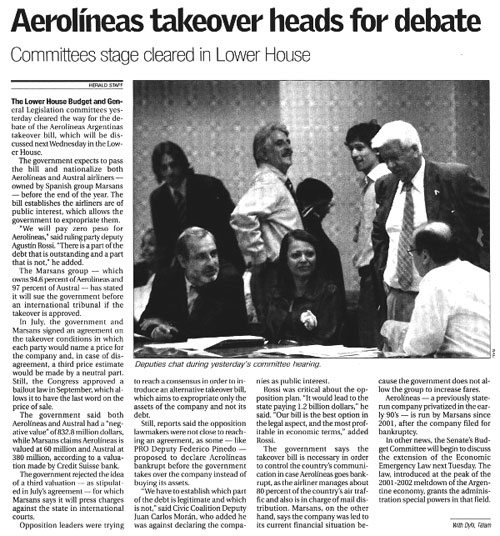28/11/2008 02:57
Buenos Aires Herald - Nota - Argentina
- Pág.3
Aerolíneas takeover
heads for debate
>Committees stage cleared in Lower House
The Lower House Budget and General Legislation
committees yesterday cleared the way for
the debate of the Aerolíneas Argentinas
takeover bill, which will be discussed next
Wednesday in the Lower House.
The government expects to pass the bill
and nationalize both Aerolíneas and
Austral airliners - owned by Spanish group
Marsans - before the end of the year. The
bill establishes the airliners are of public
interest, which allows the government to
expropriate them.
"We will pay zero peso for Aerolíneas,"
said ruling party deputy Agustín
Rossi. "There is a part of the debt
that is outstanding and a part that is not,"
he added.
The Marsans group - which owns 94.6 percent
of Aerolíneas and 97 percent of Austral
- has stated it will sue the government
before an international tribunal if the
takeover is approved.
In July, the government and Marsans signed
an agreement on the takeover conditions
in which each party would name a price for
the company and, in case of disagreement,
a third price estimate would be made by
a neutral part. Still, the Congress approved
a bailout law in September, which allows
it to have the last word on the price of
sale.
The government said both Aerolíneas
and Austral had a "negative value"
of 832.8 million dollars, while Marsans
claims Aerolíneas is valued at 60
million and Austral at 380 million, according
to a valuation made by Credit Suisse bank.
The government rejected the idea of a third
valuation - as stipulated in July's agreement-
for which Marsans says it will press charges
against the state in international courts.
Opposition leaders were trying to reach
a consensus in order to introduce an alternative
takeover bill, which aims to expropriate
only the assets of the company and not its
debt.
Still, reports said the opposition lawmakers
were not close to reaching an agreement,
as some - like PRO Deputy Federico Pinedo
- proposed to declare Aerolíneas
bankrupt before the government takes over
the company instead of buying its assets.
"We have to establish which part of
the debt is legitimate and which is not,"
said Civic Coalition Deputy Juan Carlos
Morán, who added he was against declaring
the compa vies as public interest.
Rossi was critical about the opposition
plan. "It would lead to the state paying
1.2 billion dollars," he said. "Our
bill is the best option in the legal aspect,
and the most profitable in economic terms,"
added Rossi.
The government says the takeover bill is
necessary in order to control the country's
communication in case Aerolíneas
goes bankrupt, as the airliner manages about
80 percent of the country's air traffic
and also is in charge of mail distribution.
Marsans, on the other hand, says the company
was led to its current financial situation
be cause the government does not allow the
group to increase fares.
Aerolíneas - a previously staterun
company privatized in the early 90's - is
run by Marsans since 2001, after the company
filed for bankruptcy.
In other news, the Senate's Budget Committee
will begin to discuss the extension of the
Economic Emergency Law next Tuesday. The
law, introduced at the peak of the 2001-2002
meltdown of the Argentine economy, grants
the administration special powers in that
field.

|